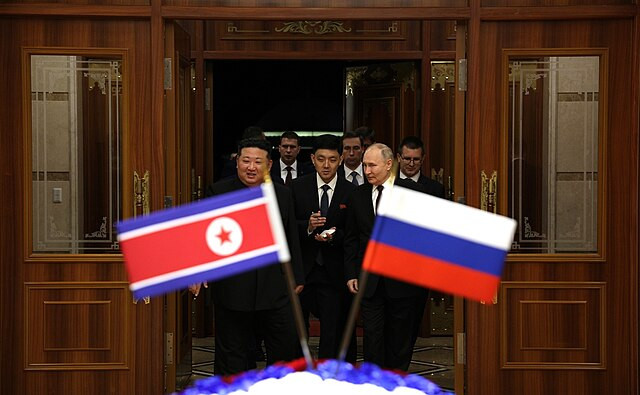South Korea is reconsidering its policy on supplying arms to Ukraine following a newly signed military assistance pact between Russia and North Korea. This agreement, revealed by North Korea's state media, requires immediate mutual military support if either nation is attacked, marking a significant escalation in their strategic partnership.
The pact, signed by Russian President Vladimir Putin and North Korean leader Kim Jong Un, mandates that if either country is invaded and pushed into a state of war, the other must deploy "all means at its disposal without delay" to provide "military and other assistance." This stipulation, while aligning with both countries' laws and the United Nations Charter's Article 51 on self-defense, has raised alarms in the region and beyond.
South Korean President Yoon Suk Yeol's office swiftly condemned the agreement, highlighting the historical context of aggression from both nations. "It's absurd that two parties with a history of launching wars of invasion-the Korean War and the war in Ukraine-are now vowing mutual military cooperation on the premise of a preemptive attack by the international community that will never happen," the statement read.
Yoon's national security adviser, Chang Ho-jin, announced that Seoul would reconsider providing arms to Ukraine, a significant shift from its previous policy. South Korea, a major arms exporter with a sophisticated military supported by the United States, has so far limited its aid to humanitarian support and economic sanctions against Russia, avoiding direct military involvement.
The summit between Kim and Putin has intensified international concerns over a potential arms deal. Observers worry that North Korea could supply Russia with much-needed munitions for its war in Ukraine in exchange for economic aid and technology transfers, potentially enhancing North Korea's nuclear and missile capabilities. Kim praised the new partnership, calling it the "strongest-ever treaty" and pledging full support for Russia's actions in Ukraine. Putin described the pact as a "breakthrough document," reflecting their mutual desire to elevate bilateral relations.
The strategic implications of this agreement are profound. Historically, North Korea and the Soviet Union had a treaty in 1961 that obligated Moscow to defend Pyongyang if it were attacked. This treaty was replaced in 2000 with a less binding agreement. The current pact appears to signal a return to more robust security commitments, although its exact terms and implications remain subject to interpretation.
Ankit Panda, a senior analyst at the Carnegie Endowment for International Peace, noted that the language of the agreement seems carefully crafted to avoid implying automatic military intervention. "The big picture here is that both sides are willing to put down on paper, and show the world, just how widely they intend to expand the scope of their cooperation," Panda said.
The deal coincided with Putin's visit to North Korea, his first in 24 years, highlighting their deepening personal and geopolitical ties. The visit featured high-profile events, including a welcoming ceremony attended by tens of thousands of North Koreans and personal exchanges between the two leaders.
The agreement also stipulates that neither country will enter into agreements with third parties that infringe on each other's "core interests" and that they must not participate in actions that threaten those interests. It calls for joint measures to strengthen defense capabilities to prevent war and protect regional and global peace and security, though it does not specify what these measures might entail.
Jenny Town, a senior fellow at the Stimson Center and director of the North Korea-focused 38 North website, emphasized the potential diplomatic fallout for South Korea. "Seoul had already signed onto sanctions against Russia for its invasion of Ukraine, souring its relations with Moscow. Now with any ambiguity of Russia's partnership with North Korea removed, how will Seoul respond?" she questioned. "Is there a point where it decides to cut or suspend diplomatic ties with Russia or expel its ambassador? And have we reached it?"
Kim Jong Un's recent foreign policy has focused on strengthening alliances with nations opposing the United States, reflecting a broader strategy of forming a united front against Washington's influence. This shift comes amid escalating tensions on the Korean Peninsula, with increased weapons tests by North Korea and intensified military exercises involving the U.S., South Korea, and Japan.




